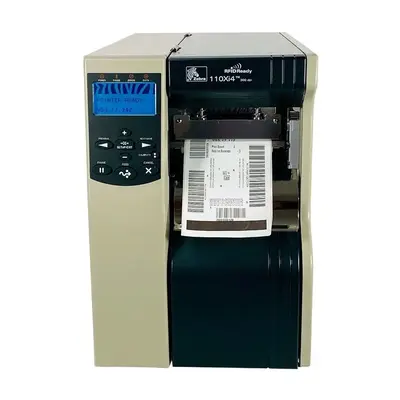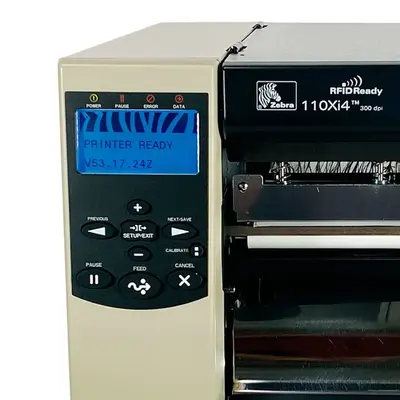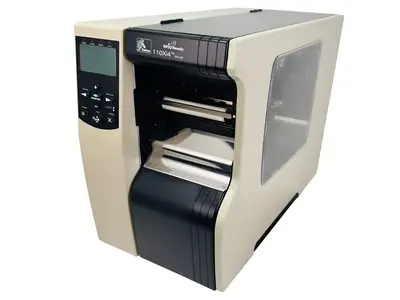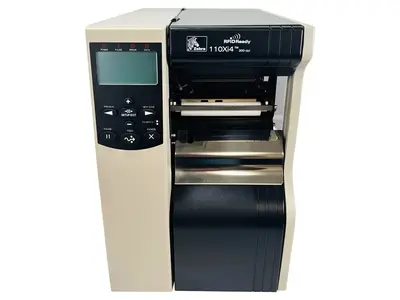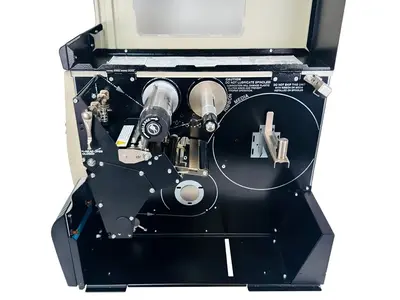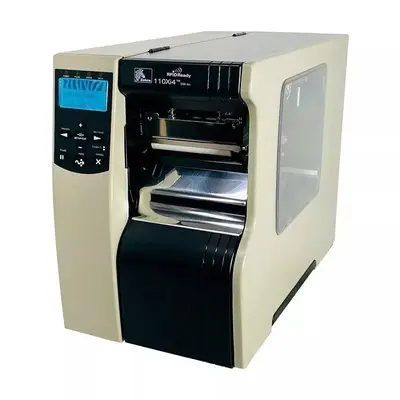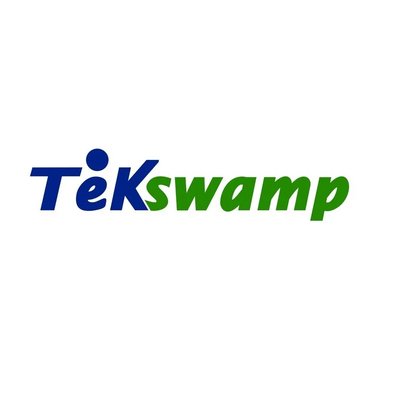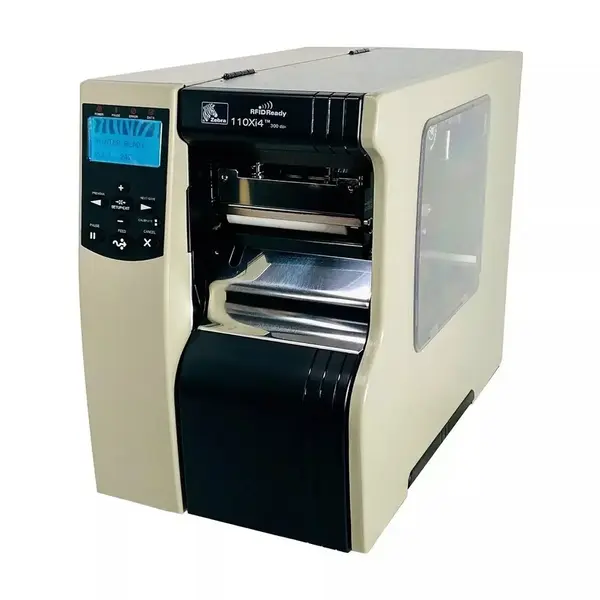
Zebra 110Xi4
| Brand | Zebra 2013 |
| Model | 113-801-00000, 300Dpi, USB LAN, Thermal Transfer, Printer, Ethernet Network, Barcode Label |
| Released Year | 2013 |
| Type | Printers |
| Series | Xi |
| Status | Active |
Quick view
Overview
The Zebra 110Xi4 is a high-performance industrial thermal transfer barcode label printer designed for demanding printing environments. It features compatibility with 300 DPI print resolution, ensuring high-quality, crisp labels suitable for a wide range of applications. The device offers multiple interface options, including USB, LAN, and Ethernet networking, facilitating seamless integration into various office and manufacturing setups. Its robust mechanical construction supports prolonged operational durability along with continuous printing capability for large volume tasks. The printer supports a wide range of media types and sizes, providing versatility for different labeling needs. Advanced printer language support, including ZPL and EPL, enhances compatibility with existing systems and workflows.
The printer utilizes an easy-to-load ribbon cartridge system optimized for thermal transfer printing, which extends label lifespan through durable, abrasion-resistant prints. Users benefit from intuitive LCD control panels and configuration settings that simplify setup and ongoing management. The device's modular design enables optional add-ons and expansion for barcode verification and RFID capabilities, broadening its functionality in enterprise environments.
Specifications
| Print Technology | Thermal Transfer |
| Print Resolution | 300 DPI |
| Print Speed | Up to 14 inches per second |
| Maximum Print Width | 4.09 inches (104 mm) |
| Media Type | Continuous, die-cut, black mark, fan-fold, notch, tag stock |
| Media Width | 0.79 to 4.65 inches (20 to 118 mm) |
| Media Thickness | 0.08 to 0.01 inches (2 to 0.254 mm) |
| Ribbon Type | Wax, wax/resin, resin |
| Ribbon Width | 1.57 to 4.33 inches (40 to 110 mm) |
| Interfaces | USB 2.0, 10/100 Ethernet, Serial (RS-232 optional) |
| Memory | 16 MB |
| Display | 4-line backlit LCD |
| Dimensions | 15.6 x 11.8 x 17.1 inches (396 x 300 x 434 mm) |
| Weight | Approx. 33 lbs (15 kg) |
| Operating Temperature | 40°F to 105°F (5°C to 40°C) |
| Power Supply | Automatic voltage adjustment, 90–132 or 180–264 VAC |
| Printer Languages | ZPL, ZPL II, EPL2 |
| Certifications | FCC Class A, UL, cUL, CE, VCCI, C-Tick |
| Input Type | Monochrome |
| Output Type | Black & White |
| Custom Bundle | No |
| MPN | 113-801-00000, 300Dpi, USB LAN, Thermal Transfer, Printer, Ethernet Network, Barcode Label |
| Supported Paper Size | Max. Width: 4.5" |
| California Prop 65 Warning | This item does NOT contain any chemicals or materials specified in the California Prop 65 list. |
| Type | Label Printer |
| Technology | Thermal |
| Maximum Resolution | 300 x 300 DPI |
| Model | 110Xi4 |
| Connectivity | Ethernet (RJ-45), Parallel (IEEE 1284), Serial (RS-232), USB 2.0 |
| Features | Networkable, RFID Ready |
| Black Print Speed | 14 ips |
| Product Line | Zebra Xi |
| UPC | 807027540683 |
Images
Key Advantages
The Zebra 110Xi4 offers remarkably high print resolution (300 DPI) for finely detailed labels, essential in barcode and product identification applications. Its versatile connectivity (USB, LAN, Ethernet) ensures effortless network and standalone printer deployment. With rugged industrial-grade construction, it withstands harsh operational environments, reducing downtime and maintenance needs. The printer’s extensive media handling options provide compatibility with diverse label and tag stocks. Easy-to-use ribbon cartridge and media loading mechanisms enhance operational efficiency and reduce user errors. Additionally, compatibility with Zebra's comprehensive software suite supports robust printer management and monitoring for enterprise environments.
Limitations
Despite its industrial build, the 110Xi4 may have a higher upfront cost compared to desktop printers, making it less accessible for small-scale operations. Its physical size and weight limit portability and require dedicated workspace. The thermal transfer mechanism consumes ribbons, which may increase consumable costs over time compared to direct thermal models. Integration complexity can arise in legacy systems without proper driver or firmware updates. Advanced networking features may necessitate additional IT expertise for optimal configuration. Finally, the lack of built-in wireless connectivity could restrict flexibility in some modern office environments.
FAQ
What printing resolution does the Zebra 110Xi4 support?
The Zebra 110Xi4 supports a high-quality 300 DPI thermal transfer printing resolution.
Which connectivity options are available on the 110Xi4 printer?
The printer provides USB, LAN, and Ethernet network connectivity for flexible integration.
Is the Zebra 110Xi4 suitable for high-volume printing environments?
Yes, its industrial-grade design is optimized for continuous, high-volume printing tasks.
Can the 110Xi4 handle different sizes and types of media?
Yes, it supports a wide range of media sizes and types for versatile labeling needs.
Does the print mechanism use ribbons or is it direct thermal?
The 110Xi4 uses a thermal transfer mechanism which requires the use of ribbons.
Is wireless connectivity available with the 110Xi4?
No, the standard model does not include built-in wireless connectivity.
Is the 110Xi4 compatible with Zebra printer management software?
Yes, it is fully compatible with Zebra's printer management and monitoring software.
Disclaimer
The content on is provided for general informational purposes only. We do not guarantee the accuracy, completeness, or reliability of any information, specifications, or visuals presented on the site.
is not responsible for any content, images, or data uploaded or shared by users. Users are solely responsible for the content they submit.
We may include links to third-party websites for convenience. We do not endorse or take responsibility for the content or policies of any external sites.
Use of the site is at your own risk. Always verify critical information independently before making decisions based on content from this website.

